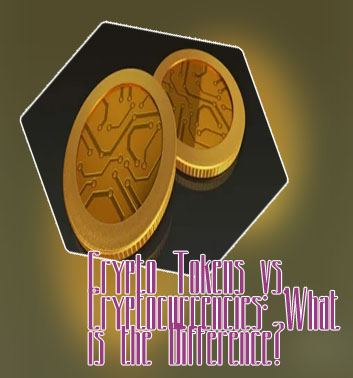
Crypto token
As more people become interested in the world of cryptocurrency, understanding the concept of crypto tokens becomes increasingly important. In order to navigate this complex topic, it is crucial to have access to reliable and informative resources. The following list of articles will provide valuable insights into the world of crypto tokens, helping readers to gain a better understanding of this digital asset.
The Ultimate Guide to Crypto Tokens: What You Need to Know

Cryptocurrency tokens have become increasingly popular in the world of digital assets. They represent a particular asset or utility and are typically built on existing blockchain platforms like Ethereum. "The Ultimate Guide to Crypto Tokens: What You Need to Know" provides a comprehensive overview of the different types of tokens, their uses, and how to navigate the complex world of tokenomics.
One of the key takeaways from this guide is the distinction between security tokens and utility tokens. Security tokens represent ownership in a real-world asset, while utility tokens provide access to a specific product or service. Understanding this difference is crucial for investors looking to participate in token sales or tokenized assets.
The guide also delves into the various token standards, such as ERC-20 and ERC-721, which have become the de facto standards for creating tokens on the Ethereum blockchain. These standards ensure interoperability between different tokens and enable developers to create innovative decentralized applications.
Overall, "The Ultimate Guide to Crypto Tokens: What You Need to Know" is an essential resource for anyone looking to understand the intricacies of cryptocurrency tokens. Whether you are a seasoned investor or just starting out in the world of blockchain technology, this guide will equip you with the knowledge needed to make informed decisions in the rapidly evolving crypto market.
How to Choose the Right Crypto Token for Your Portfolio
When it comes to building a successful crypto portfolio, selecting the right tokens is crucial. With thousands of cryptocurrencies available in the market, it can be overwhelming to choose the best ones for your investment strategy. Here are some key factors to consider when selecting crypto tokens for your portfolio:
-
Market Cap: The market capitalization of a token is an important indicator of its stability and potential for growth. Tokens with higher market caps are generally considered safer investments, as they have a larger user base and are less volatile.
-
Technology and Use Case: It is essential to evaluate the technology and use case of a token before investing. Look for tokens that have a strong technological foundation and a clear utility in the real world. Tokens with innovative technology and practical applications are more likely to succeed in the long run.
-
Team and Community: The team behind a crypto project plays a significant role in its success. Research the team members' background and experience in the crypto industry. Additionally, consider the size and engagement of the community supporting the token. A strong community can help drive adoption and increase the token's value.
-
Security and Regulation: Security is a major concern in the crypto space, so it is crucial to choose tokens that prioritize security measures. Additionally, consider
Exploring the Different Types of Crypto Tokens: Utility vs Security Tokens
Cryptocurrency has become a hot topic in the financial world, with many investors looking to capitalize on the potential gains that come with this new form of digital currency. One key aspect of the cryptocurrency market is the different types of crypto tokens available, namely utility tokens and security tokens.
Utility tokens are designed to provide access to a specific product or service offered by a company. These tokens are not considered investments, but rather a means to access a company's platform or ecosystem. On the other hand, security tokens are backed by real-world assets and represent ownership in a company. These tokens are subject to regulations and are considered investment contracts.
Both utility and security tokens have their own benefits and drawbacks. Utility tokens can provide users with access to a company's platform, while security tokens offer investors ownership in a company. It is important for investors to understand the differences between these two types of tokens in order to make informed decisions when investing in the cryptocurrency market.
To better understand the differences between utility and security tokens, investors should consider looking into the regulations surrounding these tokens, as well as the potential risks and rewards associated with each type. Additionally, investors should research the companies issuing these tokens and evaluate the potential for growth within their respective industries. By considering these factors, investors can make more informed decisions when
Top Trends Shaping the Future of Crypto Tokens in 2021
The world of cryptocurrency has been rapidly evolving, with new trends shaping the future of crypto tokens in 2021. One key trend that has emerged is the rise of decentralized finance (DeFi) tokens, which are revolutionizing the traditional financial system by offering decentralized lending, borrowing, and trading services. DeFi tokens have gained significant traction in recent months, with platforms like Uniswap and SushiSwap leading the way in providing users with innovative and efficient financial solutions.
Another trend that is shaping the future of crypto tokens is the growing popularity of non-fungible tokens (NFTs). NFTs are unique digital assets that represent ownership of a particular item or piece of content, such as art, music, or collectibles. These tokens have opened up new opportunities for creators and collectors to monetize their work and engage with their audiences in novel ways.
One practical use case of these trends can be seen in the success of an artist who tokenizes their artwork as an NFT and sells it on a decentralized marketplace. By leveraging the power of blockchain technology, the artist is able to reach a global audience, receive instant payment in cryptocurrency, and retain ownership rights over their work. This not only results in increased exposure and revenue for the artist but also fosters a sense